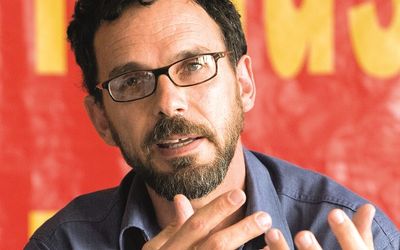ELEVEN MILLION more jobs, unemployment slashed from 25% to 6% and a dramatic reduction in inequality and poverty by 2030 are ideals with which no one in South Africa could disagree. Why then has the Congress of South African Trade Unions (Cosatu) been so vehement in its rejection of the National Development Plan, which promises these things?
The short answer is that Cosatu believes the NDP will fail.
Neil Coleman, Cosatu’s strategies co-ordinator in the secretariat, says Cosatu’s criticisms are not “a blanket objection” to the plan. It has reached an agreement with government and the ANC that only the areas of agreement will be implemented and contentious issues will be further thrashed out.
The objections, however are substantial, targeting the plan’s rationale for how jobs will be created, the quality of those jobs, the economic strategy and what it perceives to be the undermining of the manufacturing sector.
In a thorough and detailed discussion paper on the plan written by Coleman, the economic policy section is pulled apart for being based on “mistaken assumptions” and for adopting a business-as-usual approach to the macro economy, which Cosatu has always argued needs a radical transformation.
Top of the list of criticisms is the job-creation model. The plan says that of the 11-million jobs it sees being created by 2030, 90% will be created by small and medium companies. This, says Cosatu, is highly unrealistic, given that trends show it is larger companies that have been responsible for most of the net job creation over the 10 past years.
Related to this is a political objection. Jobs in small companies, especially in the services sector — which is what the NDP identifies as the engine of job creation in the first 10 years — are likely to be low-paid and low-skilled. Part of the reason Cosatu’s economic policy tends to focus on manufacturing and industrial jobs rather than ones in the services sector is that these tend to be higher skilled and better paid, fitting with its desire for “decent work”.
“The SMME-dominated, low-wage employment strategy is very different from the decent-work policy mandate of the ANC and alliance, as well as economic policy documents of government,” says Coleman.
Closely related to the plan’s emphasis on the services sector is its “neglect” of strategies to promote industrialisation. Cosatu has campaigned to secure industrialisation as part of government economic development policy, with some success. Since 2009, the Industrial Policy Action Plan has been devised by the minister of trade and industry, Rob Davies, and a new growth path strategy drawn up by the minister of economic development, Ebrahim Patel.
The NDP, Cosatu says, makes no mention of the industrial policy action plan in its 484 pages and only half-heartedly supports the idea of industrial policy.
While Cosatu argues that the emphasis on industrialisation will “alter the trajectory” of growth, the NDP, by contrast, “proposes strategies entrenching some of the worst features of the old growth path”.
A third area of major criticism is macroeconomic policy, which Cosatu has long argued needs a radical makeover. Resolutions by the ANC at its 2012 conference for “a radical shift” in policy looked as if they might open this door, but the NDP negates that. The plan’s vision for macroeconomic policy follows what has gone before, the federation complains, with fiscal constraints, floating exchange rates, a focus on inflation and a policy of non-intervention in financial markets.
From these fundamental economic policy objections flow a range of political implications, which deepen Cosatu’s opposition to the plan.
The first political objection is that the plan’s economic policy emphasis — on small businesses and the rapid expansion of services-type jobs — implies that labour markets will be deregulated. For Cosatu, labour deregulation remains non-negotiable. Concessions for small and medium firms, it says, would “have the effect of undermining existing worker rights and promoting a new stratum of ultra low-paid, first-time workers, earning even less than low-paid workers are currently earning”.
Cosatu’s second set of political objections is over the commission’s choice of a poverty measure of R418 a person a month, which it says is too low, and its admission that even if all the targets of the plan are achieved there will still be a large gap between the richest and the poorest.
At a recent meeting with the ANC, Cosato secured its commitment to a joint resolution taking account of all its concerns.
The status of the plan, in Cosatu’s eyes, remains ambiguous.
...
Why services matter
IN LOOKING to promote employment in labour-intensive industries, evidence led the National Planning Commission to view domestic-oriented activities and the services sector as the most promising, says commissioner Miriam Altman.
She says some elements of the plan that are based on reality are being criticised because the reality may not be to their liking. “The NDP says that the majority of employment, between 70% and 80%, will be created in the services sector. This is the character of employment-creation globally. The NDP says 90% of jobs will be created by small and expanding firms. It wants the economy to be more enabling of business expansion, with an eye to credit and market access.”
That, says Altman, was borne out of research on global trends. “The biggest growth in global trade is in services. Think about retail, housing construction, tourism and the thousands of small businesses in personal services.”
Malaysia and Korea have both been successful in stimulating their domestic services sectors as part of their industrial mix, she says, and this could be a massive job creator for South Africa.
“The reality is that growth is in services. You can’t put your head in the sand, it will be a missed opportunity.”
It is important, Altman says, to understand the fundamental issue of South Africa’s economy: the need to create jobs is paramount, but the cost of living is rising, therefore people are becoming poorer. “This is critical, and one of the goals of the NDP is to bring the cost of living down.”
— Colin Anthony

Neil Coleman. Picture: BUSINESS DAY
ELEVEN MILLION more jobs, unemployment slashed from 25% to 6% and a dramatic reduction in inequality and poverty by 2030 are ideals with which no one in South Africa could disagree. Why then has the Congress of South African Trade Unions (Cosatu) been so vehement in its rejection of the National Development Plan, which promises these things?
The short answer is that Cosatu believes the NDP will fail.
Neil Coleman, Cosatu’s strategies co-ordinator in the secretariat, says Cosatu’s criticisms are not “a blanket objection” to the plan. It has reached an agreement with government and the ANC that only the areas of agreement will be implemented and contentious issues will be further thrashed out.
The objections, however are substantial, targeting the plan’s rationale for how jobs will be created, the quality of those jobs, the economic strategy and what it perceives to be the undermining of the manufacturing sector.
In a thorough and detailed discussion paper on the plan written by Coleman, the economic policy section is pulled apart for being based on “mistaken assumptions” and for adopting a business-as-usual approach to the macro economy, which Cosatu has always argued needs a radical transformation.
Top of the list of criticisms is the job-creation model. The plan says that of the 11-million jobs it sees being created by 2030, 90% will be created by small and medium companies. This, says Cosatu, is highly unrealistic, given that trends show it is larger companies that have been responsible for most of the net job creation over the 10 past years.
Related to this is a political objection. Jobs in small companies, especially in the services sector — which is what the NDP identifies as the engine of job creation in the first 10 years — are likely to be low-paid and low-skilled. Part of the reason Cosatu’s economic policy tends to focus on manufacturing and industrial jobs rather than ones in the services sector is that these tend to be higher skilled and better paid, fitting with its desire for “decent work”.
“The SMME-dominated, low-wage employment strategy is very different from the decent-work policy mandate of the ANC and alliance, as well as economic policy documents of government,” says Coleman.
Closely related to the plan’s emphasis on the services sector is its “neglect” of strategies to promote industrialisation. Cosatu has campaigned to secure industrialisation as part of government economic development policy, with some success. Since 2009, the Industrial Policy Action Plan has been devised by the minister of trade and industry, Rob Davies, and a new growth path strategy drawn up by the minister of economic development, Ebrahim Patel.
The NDP, Cosatu says, makes no mention of the industrial policy action plan in its 484 pages and only half-heartedly supports the idea of industrial policy.
While Cosatu argues that the emphasis on industrialisation will “alter the trajectory” of growth, the NDP, by contrast, “proposes strategies entrenching some of the worst features of the old growth path”.
A third area of major criticism is macroeconomic policy, which Cosatu has long argued needs a radical makeover. Resolutions by the ANC at its 2012 conference for “a radical shift” in policy looked as if they might open this door, but the NDP negates that. The plan’s vision for macroeconomic policy follows what has gone before, the federation complains, with fiscal constraints, floating exchange rates, a focus on inflation and a policy of non-intervention in financial markets.
From these fundamental economic policy objections flow a range of political implications, which deepen Cosatu’s opposition to the plan.
The first political objection is that the plan’s economic policy emphasis — on small businesses and the rapid expansion of services-type jobs — implies that labour markets will be deregulated. For Cosatu, labour deregulation remains non-negotiable. Concessions for small and medium firms, it says, would “have the effect of undermining existing worker rights and promoting a new stratum of ultra low-paid, first-time workers, earning even less than low-paid workers are currently earning”.
Cosatu’s second set of political objections is over the commission’s choice of a poverty measure of R418 a person a month, which it says is too low, and its admission that even if all the targets of the plan are achieved there will still be a large gap between the richest and the poorest.
At a recent meeting with the ANC, Cosato secured its commitment to a joint resolution taking account of all its concerns.
The status of the plan, in Cosatu’s eyes, remains ambiguous.
...
Why services matter
IN LOOKING to promote employment in labour-intensive industries, evidence led the National Planning Commission to view domestic-oriented activities and the services sector as the most promising, says commissioner Miriam Altman.
She says some elements of the plan that are based on reality are being criticised because the reality may not be to their liking. “The NDP says that the majority of employment, between 70% and 80%, will be created in the services sector. This is the character of employment-creation globally. The NDP says 90% of jobs will be created by small and expanding firms. It wants the economy to be more enabling of business expansion, with an eye to credit and market access.”
That, says Altman, was borne out of research on global trends. “The biggest growth in global trade is in services. Think about retail, housing construction, tourism and the thousands of small businesses in personal services.”
Malaysia and Korea have both been successful in stimulating their domestic services sectors as part of their industrial mix, she says, and this could be a massive job creator for South Africa.
“The reality is that growth is in services. You can’t put your head in the sand, it will be a missed opportunity.”
It is important, Altman says, to understand the fundamental issue of South Africa’s economy: the need to create jobs is paramount, but the cost of living is rising, therefore people are becoming poorer. “This is critical, and one of the goals of the NDP is to bring the cost of living down.”
— Colin Anthony














 A guide for business to the NDP, with interviews, features and infographics
A guide for business to the NDP, with interviews, features and infographics






Change: -0.47%
Change: -0.61%
Change: 0.53%
Change: -0.42%
Change: -2.12%
Data supplied by Profile Data
Change: -0.46%
Change: -0.22%
Change: -0.47%
Change: 0.00%
Change: -0.21%
Data supplied by Profile Data
Change: -1.29%
Change: -1.20%
Change: -0.73%
Change: -1.36%
Change: -1.24%
Data supplied by Profile Data
Change: 0.62%
Change: 1.35%
Change: 1.45%
Change: 0.00%
Change: 1.15%
Data supplied by Profile Data